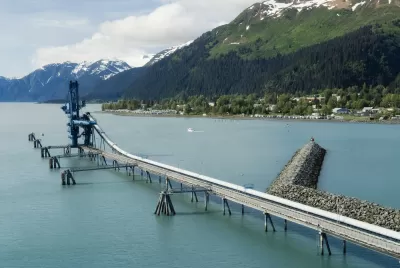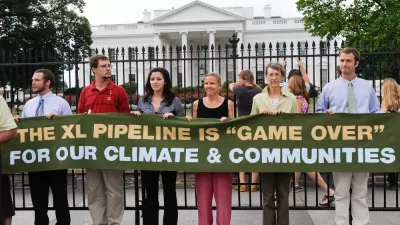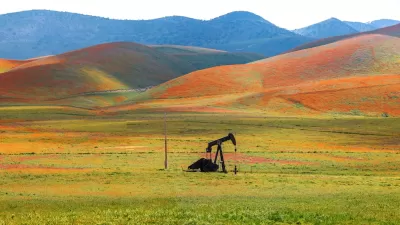The 'Willow' project would pump 600 million gallons of oil and emit 500 metric tons of carbon dioxide in the next 30 years.

"A federal judge’s decision on Wednesday to block a massive oil drilling project in Alaska’s National Petroleum Reserve handed a major victory to Indigenous and environmental advocates," reports Georgina Gustin.
"The so-called 'Willow' project envisioned by ConocoPhillips would extract nearly 600 million barrels of oil over the next three decades," explains Gustin of the project approved by the Trump administration and supported by the Biden administration. Environmentalists sued to stop the project shortly after it was approved last fall.
Judge Sharon L. Gleason of the United States District Court for Alaska agreed with opponents of the project, "writing that the administration’s approval of the project was arbitrary and capricious because it failed to account for the full scope of greenhouse gas emissions or for dangers to wildlife, including polar bears," reports Gustin.
Jeremey Lieb, a lawyer with Earthjustice, which represented several groups in the case, is cited in the article saying the project would add 500 million metric tons of carbon dioxide if allowed to proceed.
While the Biden administration has taken some steps to reverse some of the environmental decisions of the Trump administration affecting the state of Alaska, including a July decision to end the sale of large-scale, old-growth timber in the state's Tongass National Forest, approved by the Trump administration in October 2020.
The Biden administration supported the Willow project, however, "even as it attempts to advance an ambitious agenda that tackles climate change and shifts the country toward a fossil fuel-free future."
FULL STORY: A Federal Judge’s Rejection of a Huge Alaska Oil Drilling Project is the Latest Reversal of Trump Policy

Maui's Vacation Rental Debate Turns Ugly
Verbal attacks, misinformation campaigns and fistfights plague a high-stakes debate to convert thousands of vacation rentals into long-term housing.

Planetizen Federal Action Tracker
A weekly monitor of how Trump’s orders and actions are impacting planners and planning in America.

In Urban Planning, AI Prompting Could be the New Design Thinking
Creativity has long been key to great urban design. What if we see AI as our new creative partner?

King County Supportive Housing Program Offers Hope for Unhoused Residents
The county is taking a ‘Housing First’ approach that prioritizes getting people into housing, then offering wraparound supportive services.

Researchers Use AI to Get Clearer Picture of US Housing
Analysts are using artificial intelligence to supercharge their research by allowing them to comb through data faster. Though these AI tools can be error prone, they save time and housing researchers are optimistic about the future.

Making Shared Micromobility More Inclusive
Cities and shared mobility system operators can do more to include people with disabilities in planning and operations, per a new report.
Urban Design for Planners 1: Software Tools
This six-course series explores essential urban design concepts using open source software and equips planners with the tools they need to participate fully in the urban design process.
Planning for Universal Design
Learn the tools for implementing Universal Design in planning regulations.
planning NEXT
Appalachian Highlands Housing Partners
Mpact (founded as Rail~Volution)
City of Camden Redevelopment Agency
City of Astoria
City of Portland
City of Laramie





























